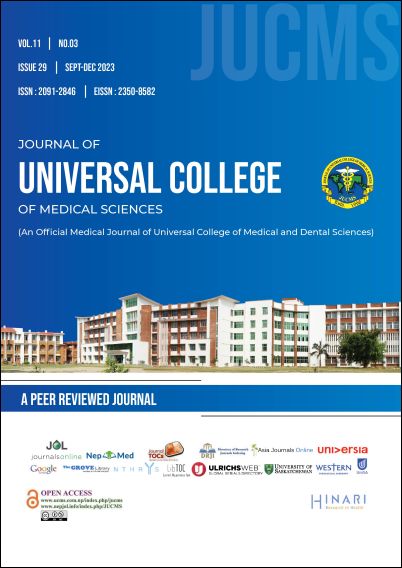Diabetes Mellitus & Thyroid Dysfunction in Vitiligo of Terai Regions of Nepal
DOI:
https://doi.org/10.3126/jucms.v11i03.61476Keywords:
Vitiligo, Thyroid Dysfunction, Diabetes MellitusAbstract
INTRODUCTION Vitiligo is common acquired disease. Clinically it present with depigmented, macules and patches. Vitiligo has been shown association with many autoimmune diseases like Diabetes mellitus, Thyroid disorders, Graves disease, pernicious anemia, etc. This study was undertaken to assess the prevalence and association of diabetes mellitus and thyroid dysfunction in vitiligo patient.
MATERIAL AND METHODS This study was a case control study carried out in Dermatology Department, Universal College of Medical Sciences – Teaching Hospital (UCMS-TH) from Dec 2022 to Nov 2023. 70 cases of Vitiligo and 70 control with same sex, ages and gender matched were enrolled. All patients in both the group, we performed thyroid function test and fasting blood sugar.
RESULTS Out of 70 cases, 6 (8.6%) people has impaired FBS and 6 (8.6%) people have high T3 & T4 and 10 (14.3%) people have high TSH whereas 3 (4.3%) people have low T3 & T4 and 4 (5.7%) people have low TSH. Association with different age group in both case and control group with fasting blood sugar and thyroid function test was seen which was statistically not significant.
CONCLUSION There were impaired fasting blood sugar and abnormal thyroid dysfunction in many cases. Therefore vitiligo patient needs to undergo thyroid function test and blood sugar level to prevent the complication.
Downloads
Downloads
Published
How to Cite
Issue
Section
License
Copyright (c) 2023 Journal of Universal College of Medical Sciences

This work is licensed under a Creative Commons Attribution-NonCommercial 4.0 International License.
Authors have to give the following undertakings along with their article:
- I/we declare that this article is original and has not been submitted to another journal for publication.
- I/we declare that I/we surrender all the rights to the editor of the journal and if published will be the property of the journal and we will not publish it anywhere else, in full or part, without the permission of the Chief Editor.
- Institutional ethical and research committee clearance certificate from the institution where work/research was done, is required to be submitted.
- Articles in the Journal are Open Access articles published under the Creative Commons CC BY-NC License (https://creativecommons.org/licenses/by-nc/4.0/)
- This license permits use, distribution and reproduction in any medium, provided the original work is properly cited, and it is not used for commercial purposes.




